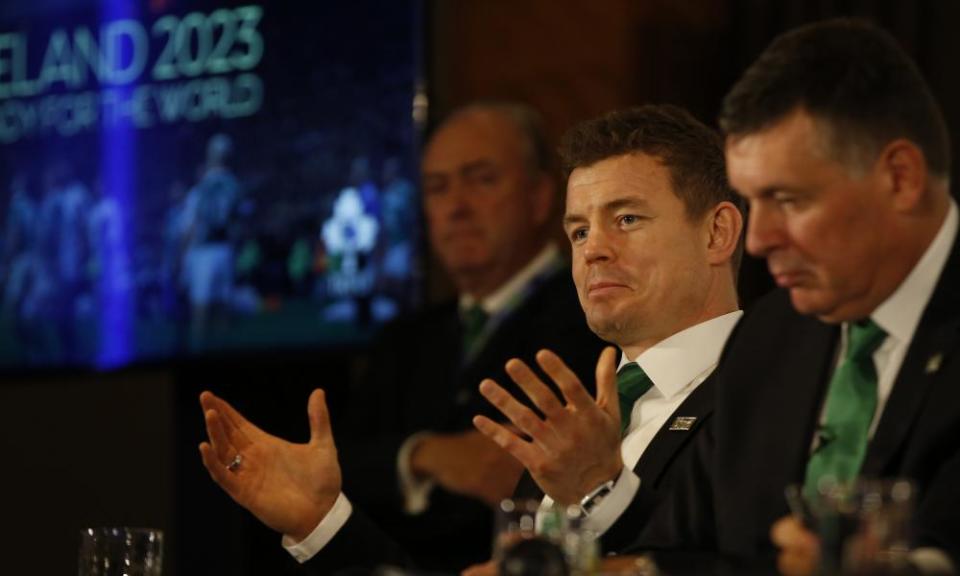Theresa May backs Ireland for 2023 World Cup as French bid hits problems

Theresa May has given her official backing to Ireland’s bid to host the 2023 Rugby World Cup in what can be considered a boost to its chances given how the France president, Emmanuel Macron, has distanced himself from its attempts to host the tournament.
The Irish Taoiseach, Leo Varadkar, the only state leader in attendance as France, Ireland and South Africa made their final presentations in London on Monday, revealed that the prime minister has pledged the UK’s support. “[Theresa May] has written to World Rugby supporting our bid, and assuring them that the United Kingdom government is behind it too,” he said. “And I’m very grateful for the fact that she’s done that.”
In the absence of an official endorsement from Macron, France opted to tug on the heart strings with the sons of the late All Blacks wing Jonah Lomu – Brayley and Dhyreille, who was born in Marseille, when Jonah spent a season on the south coast of France – acting as part of their presentation team.
“[Dyhreille] told us earlier, quite simply, he’s known as the Frenchie at home,” said the France bid ambassador and former international Sébastien Chabal. “They said they would love to come back in 2023 to experience the World Cup in the country where their father was so happy.”
Macron decided against coming to London for the presentation, then he pulled out of recording a video of official support and his absence did not go unnoticed by France’s rivals. Varadkar, the former sports minister, was front and centre of their bid while South Africa’s presentation was led by the deputy president, Cyril Ramaphosa.
“I’m delighted to be here in person, I wouldn’t have missed today for anything,” was Varadkar’s opening gambit, while Francois Pienaar, ambassador for South Africa’s bid having lifted the World Cup as the Springboks captain in 1995, went as far as to paraphrase Woody Allen by saying “80% of the pitch is turning up”.
France’s bid is, however, financially robust – its leader, Claude Atcher, has pledged to fill World Rugby’s coffers enough to avoid “the death of international rugby” – but while they attempted to accentuate the positives, Paris’s success in landing the 2024 Olympics is a worry considering the growing concern that Tokyo 2020 will affect Japan 2019 ticket sales. “There will be huge synergies between these two events,” said the sports minister, Laura Flessel. “We’re not going to compete with 2024, far from it. It is in no way in opposition to the Olympics.”
To host the World Cup effectively costs £120m – asked for as a minimum guarantee – and last week Atcher revealed France had pledged £150m. Ireland has not gone above the minimum but South Africa on Monday said it would do so to the tune of £160m. Just like France, South Africa has also pointed to the fact that it has held the Rugby World Cup before, when Nelson Mandela, wearing a Springboks jersey, famously handed the trophy to Pienaar. The issue with South Africa’s bid, however, is the uncertain financial and political climate which in March forced Durban to pull out of hosting the 2022 Commonwealth Games.
Ramaphosa attempted to allay fears by citing how South Africa is just 23 years into its “democratic journey” and will be “real adults” in 2023. “Political stability is guaranteed; it’s in the bank,” he said. “What Nelson Mandela said, that rugby is a great unifier, will be played out in reality.”
Ireland meanwhile, turned on the charm with Brian O’Driscoll promising “100,000 welcomes” and that all visitors would be “smothered with love”. Questions were asked about Brexit during its presentation as well as infrastructure but the Irish Rugby Football Union chief executive, Philip Browne, was in bullish mood. “As the process has gone on, we’ve become more and more confident of the credibility of our financial package and the bid that we’ve put together,” he said.
With the three countries now having made their final bids, a recommendation will be made to the Rugby World Cup board on 31 October by an independent review group, with a final vote made by the unions on 15 November.

 Yahoo Sport
Yahoo Sport 





































